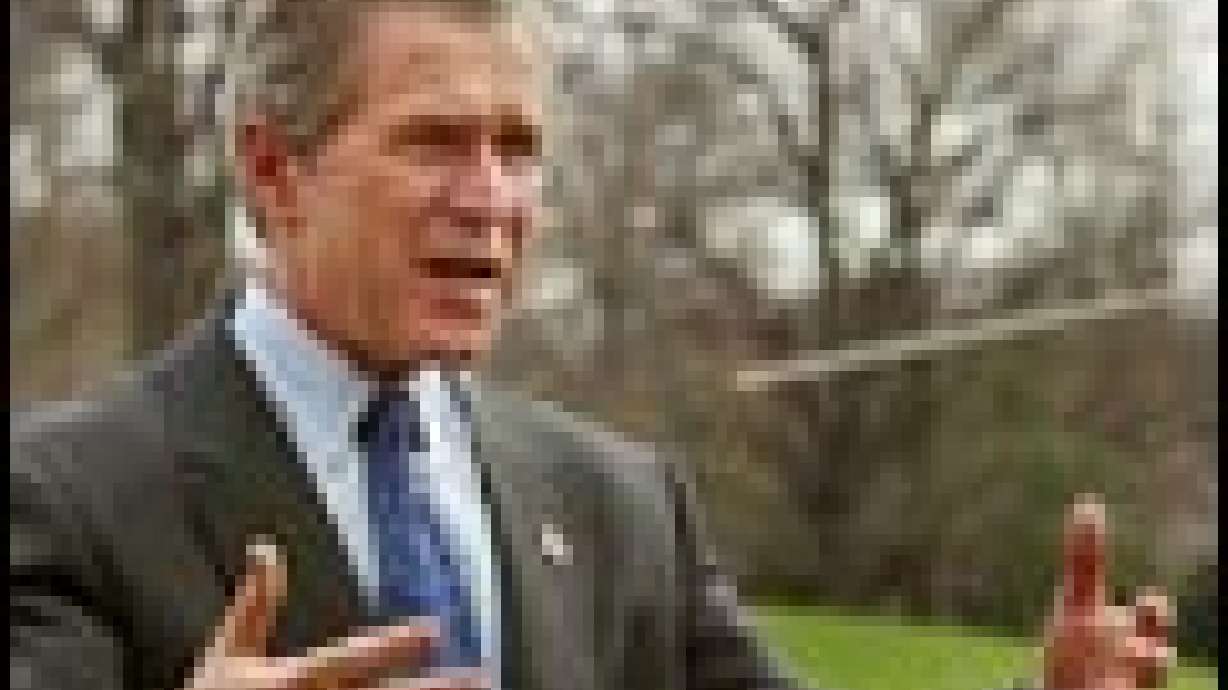Estimated read time: 4-5 minutes
This archived news story is available only for your personal, non-commercial use. Information in the story may be outdated or superseded by additional information. Reading or replaying the story in its archived form does not constitute a republication of the story.
WASHINGTON (AP) -- President Bush demanded on Sunday that American troops held captive in Iraq be treated humanely and said he was pleased with the progress of the war.
"Saddam Hussein is losing control of his country," Bush said. He did not say whether he thought the Iraqi president was dead, alive or injured, but a senior White House official said there was no new information about Saddam's status.
"It's going to take a while to achieve our objective, but we're on course, we're determined, and we're making good progress," said Bush, who aides said planned a midweek visit to a military base in the United States.
Bush spoke to reporters shortly after an Arab satellite station aired footage from Iraqi television of interviews with what the station identified as captured American prisoners. The tape also showed bodies in uniform in an Iraqi morgue, who the station said were Americans.
Bush, returning to the White House from his Camp David retreat in Maryland, said he did not have all the details of what he called a potential capture but added: "We expect them to be treated humanely, just like we'll treat any prisoners of theirs that we capture humanely. If not, the people who mistreat the prisoners will be treated as war criminals."
"I think it's an interesting contrast, that a lot of their soldiers welcome our troops and are surrendering happily, gleefully, and they'll be treated well," Bush said. He said he had not been told that allied troops had been murdered.
Bush said he was being updated constantly about the war effort. He spent the afternoon in the White House residence meeting with advisers after an intelligence briefing early Sunday conducted by White House Chief of Staff Andrew Card and his national security adviser, Condoleezza Rice.
Participating in the briefing by videoconference were Marine Gen. Pete Pace, vice chairman of the Joint Chiefs of Staff; Defense Secretary Donald H. Rumsfeld; Deputy Defense Secretary Paul Wolfowitz; and CIA Director George Tenet.
Bush, who attended church at Camp David with his wife, Laura, said he mourned at church for those killed in the war and had asked God to comfort those grieving.
The president sought to brace the country for what could be drawn-out military action.
"There's pockets of resistance, but we're making good progress," Bush said. "This is just the beginning of a tough fight."
"We're slowly but surely achieving our objective," Bush said. "We're just in the beginning phases. We're executing a plan which will make it easier to achieve our objective and at the same time spare innocent life."
Asked whether there was a possibility of an Iraqi surrender, he said: "All I know is we got a game plan, a strategy, to free the Iraqi people from Saddam Hussein and rid his country of weapons of mass destruction. And we're on plan."
Bush said he was thankful Iraq has not used any such weapons but sidestepped a question about whether he was surprised none has been found. Bush's conviction that Iraq has such weapons formed the primary rationale for last week's invasion.
The president suggested it was too late for the Iraqi leader to give up power -- the condition Bush set last week for Iraq to avoid war. "He had his chance to go into exile," Bush said.
But he promised that "massive amounts" of humanitarian aid were poised to move into Iraq in the next 36 hours.
"That's going to be positive news for those who suffered a long time under Saddam Hussein," he said.
Bush expressed relief that American and British forces had swiftly controlled key parts of Iraq's southern oil fields. Nine wells have been reported to be on fire; Iraq's northern fields appeared to have avoided damage thus far.
In recent days the United States has been pressuring Turkey not to send its troops into northern Iraq, a message Bush reinforced firmly Sunday.
Turkey insists it will send troops into the autonomous Kurdish areas of northern Iraq to prevent any massive flow of refugees or to stop the creation of a Kurdish state. Turkey fears that a Kurdish state could revitalize Kurdish rebels who battled the Turkish government for 15 years.
"We have got more troops up north, and we're making it very clear that we expect them not to come into northern Iraq," Bush said. "They know our policy, and it's a firm policy, (and) they know we're working with the Kurds to make sure there's not an incident" that would prompt a Turkish military response.
Bush planned to meet Monday afternoon with congressional leaders, including appropriators, to brief them on the war costs. The White House has refused to offer lawmakers or taxpayers a price tag, saying there were too many variables at play.
A senior administration official said the cost Bush planned to give lawmakers would be between $70 billion and $90 billion.
(Copyright 2003 by The Associated Press. All Rights Reserved.)









